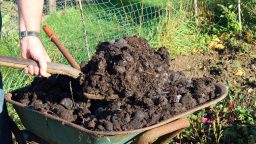Manure is one the best, all-natural fertilizers around. Yes, it does smell, since it consists of animal feces. However, its many benefits far outweigh the stench. You’ll be glad that you put up with it when your plants are growing strong and tall. Before you begin spreading manure around your garden willy-nilly, take the time to review these five useful tips.
1) Don’t Place Manure around Your Edible Vegetables
You might be tempted to use manure to fertilize every single plant in your garden, after all, it’s good for all of them, right? Wrong. You never want to use it around any edible vegetable or fruit plants, or even on your herbs. It can dehydrate and burn your plants, as it’s very strong. On top of this, manure is full of bacteria. This means that you might end up transferring salmonella and E. coli to your edible crops. All of the washing in the world may not be enough to keep them contaminant free. Note: this is based on fresh manure directly applied to your soil. There are steps you can take to apply composted manure as fertilizer.
2) Research Your Manure before Using It
Yes, manure is usually all-natural, as in it comes from animals. This doesn’t mean that your batch won’t contain trace amounts of various medications, antibiotics, and pesticides. These things can leach into your soil where they’ll negatively affect your plants. The chemicals in them can also kill off the beneficial microbes that make manure such a useful fertilizer. You need to be careful when using random batches of it. Always ask the provider (as in the farmer or store employee, not the animals) before buying your next supply. Note: if you are supplying the manure from your own livestock, you will know what they have been fed and ingesting in their bodies.
3) Age Your Manure
Aged manure is what’s best for your garden. The fresh stuff can stink and even burn your plants. Aged manure doesn’t smell as bad (although you might find that it has some lingering odors) and contains all of the proper nutrients. The aging process entails drying the manure at around 160 degrees Fahrenheit for several hours or days. Then, it’s left to sit for several months, ideally six months to a year. The end results are powdery and less moist. Many of the harmful pathogens will have been killed off as well.
4) Place Some in Your Compost Pile
If you already have a compost pile and need something to do with your fresh manure, then we have a solution for you. Place the manure in that pile and let it cure. Over the course of the next two to four months, your manure will break down along with the rest of the “ingredients” in your compost pile. With that said, this only works well if you add a small amount of manure to an already well-blended compost pile. You need an outdoor pile, as well, not one of those tumbler bins. They won’t work well, and the manure won’t break down properly. Since composting is quite different from aging your manure, you can test out both methods, provided that you have space, to see which one you like the best.
Related Article: The Best All Natural Fertilizers For Your Garden
5) Make Manure Tea
This sounds completely unpalatable to the human ear. And yes, you don’t want to drink the manure tea yourself. Your plants will love it though. This liquid mixture of manure dissolved in water is just what your plants need. Your rosebushes, in particular, will love it. Once you have your “manure tea” ready, just pour it around the roots of your non-edible plants. They’ll soak up the liquid as if it were just water. The only difference is that this is a more powerful form of water, one with plenty of vitamins and nutrients.
Conclusion
While there are many steps and precautions to take when implementing manure, it is one of the most beneficial, natural fertilizers you can use. Your plants will thank you!
[Bonus] This strange method will make your food last for 2 years without refrigeration. Learn More>>>


